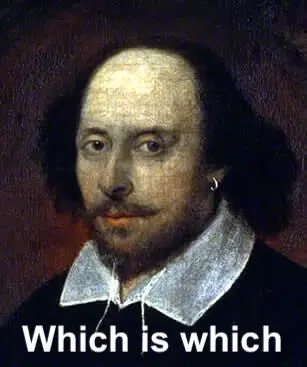‘Which is which?’ – often expressed as a question, asking for help in distinguishing two similar things or people.
Which is which
What's the meaning of the phrase 'Which is which'?
What's the origin of the phrase 'Which is which'?
‘Which’ is an extremely ancient English word, the modern spelling deriving from the Old English ‘hwilc’, which dates from the 8th century. There was a myriad of other spellings for ‘which’ – the OED lists no less than 64 of them – for example ‘wheche’, ‘quhilche’, ‘wych’ and so on.
Likewise, ‘which is which’ is one of the oldest English phrases still in daily use. The earliest form of ‘which is which’ in print is found in the 14th century Northumbrian poem Cursor Mundi, which uses a ‘quilk’ spelling:
Wel sal he cun knau quilk es quilk.
The first person to record ‘which is which’ in modern English was William Shakespeare, who used the expression in several of his plays, including Macbeth, 1605:
What is the night? Almost at oddes with morning, which is which.
Almost immediately after that line, Shakespeare gave the stage direction ‘Enter three Witches’. He didn’t however go on to make the play on words ‘which witch is which?’ – that had to wait until the 20th century. The first example I can find occurred, appropriately, on Halloween 1931, in the Wisconsin newspaper The Appleton Post-Crescent:
There’s nothing like a Halloween moon to make people wonder which witch is witch.
The history of “Which is which” in printed materials
Trend of which is which in printed material over time
Related phrases and meanings
Browse more Phrases
About the Author

Phrases & Meanings
A-Z
A B C D E F G H I J K L M N O P Q R S T UV W XYZ
Categories
American Animals Australian Bible Body Colour Conflict Death Devil Dogs Emotions Euphemism Family Fashion Food French Horses ‘Jack’ Luck Money Military Music Names Nature Nautical Numbers Politics Religion Shakespeare Stupidity Entertainment Weather Women Work
How did we do?
Have you spotted something that needs updated on this page? We review all feedback we receive to ensure that we provide the most accurate and up to date information on phrases.
